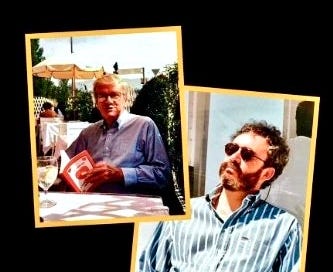Joy, the water expert, still in Israel, became aggressive and tried to undermine our efforts while promoting her own agenda. Apparently, she was not happy as an Israel-based consultant. She felt she deserved to run the whole shebang. To this end, she maneuvered around Herbertville, plunging a knife into Alan’s back at every opportunity. (Alan being our new business manager.)
When I informed Clair George, he simply sighed, “It’s the history of the world.”
We responded by cutting Joy out of the loop, no longer routing our findings and plans to her. When she called, we listened to her whining and fed her generalities. Then Herbert came to our rescue, decreeing at a meeting attended by all of us that Joy stick to the Middle Eastern philanthropic side of things and stay out of our Central European commercial operation.
After two months of intensive, diligent study, Alan identified a commercial opportunity for breaking into the water industry. He drafted a detailed business plan. Alan and I shuttled to New York to present it to Herbert.
Enter Dick, newly appointed “financial chief-of-staff” to Herbert.
Herbertville felt tense this trip, as if Herbert’s erraticism had given way to power plays among those closest to him.
Unwittingly, Alan and I, and Clair, had stumbled into a cutthroat no-man’s-land that appeared to exist with Herbert’s blessing, if not outright encouragement. But rather than be embarrassed by the hostile bickering around him, Herbert seemed to relish such infighting; after all, his minions were battling for his attention.
A smarmy sort from Herbert’s office was brought forth to meet us, and he spoke to each of us one by one as if we were applying for jobs. Arms folded (defensive body language) he asked, “So what is your qualification in water?”
When he got to me, I returned his smarmy smile with my own and pointed to Herbert. “I’m his partner.”
It was a dispiriting experience, and especially unfair to Alan, who had worked hard, putting in long hours to harness what evolved into a brilliant plan to enter the water industry and overnight become a formidable entity at a relatively low entrance fee.
The ax fell soon after, wielded by the soft-spoken Dick, who arrived in Washington with a charter to neuter Herbert’s penchant for creating new companies at whim.
That was how Dick explained it to Alan: “We’re looking for 30-to-40 percent returns on risky ventures.” Dick pointed out that the water industry operated at lower margins, about 25 percent.
Of course, our water project had been borne out of Herbert’s idealistic streak, not as a money-spinning enterprise. As Herbert early on told the spymaster and me, “This isn’t about selling a product. I can make money selling soap flakes. This is much more important.”
Dick graciously told Alan that Herbert would honor his two-year retainer and that Alan could use the pre-paid office to develop new projects for himself.
Just as well, as the L.Q. (laugh quotient) had evaporated like, well, water.
Enthralled with what Clair and I did as creative problem solvers, Alan wanted to develop us into a worldwide private intelligence company. To this end, I created a fictional Chatham-Brooke & Company.
This mysterious entity sent invitations to all of our spooky subcontractors to attend its “175th Annual Christmas Party” at DeCarlo’s restaurant on December 15th, 1997.
I wrote a speech for Clair to read aloud explaining Chatham-Brooke:
As most of you know, Chatham-Brooke & Company was founded in 1822 in New Haven, Connecticut, by Arthur Chatham III and Trevor Brooke. Ten years later, it facilitated the Russell Trust Association, which gave birth to Skull & Bones at Yale University. It was a tradition for a hundred years thereafter to recruit Bonesmen as associates.
During the Civil War, Trevor Brooke advised President Lincoln on intelligence matters. Indeed, a Chatham-Brooke associate, Al Pinkerton, was seconded to the White House. The publicity prone Pinkerton moved on to form the (not so) Secret Service.
Henry Chatham, Arthur’s favorite nephew, shepherded Chatham-Brooke into the 20th century. By then, the company had moved to New York City, and kept space beneath J.P. Morgan on Wall Street. They did not have pages in those days. When J.P. needed to know something, he wrapped his ebony cane on the hardwood floor, and Henry would scoot upstairs to satiate the financier’s thirst for information on whatever Bernard Baruch was doing.
In 1917, when Woodrow Wilson was contriving to get the USA into World War I, it was Henry who forged the Zimmerman Telegram that gave Wilson what he needed.
But I’ll tell you this: When Secretary of War Henry Stimson said, “Gentlemen don’t read other gentlemen’s mail,” it was our own Henry Chatham who replied, “Pishaw.”
I’m pleased to say that, during the 1930s, Chatham-Brooke shed its establishment roots to challenge those within the foreign policy elite who appeased Hitler. When William Stephenson, so-called Intrepid, arrived in New York City on behalf of British Intelligence to strategize a U.S. entry into World War II, the first call he made was to Henry Chatham, Jr. Later, John J. McCloy wouldn’t so much as blow his nose without checking first with Junior.
At the start of the Cold War, after dear junior passed on, Chatham-Brooke moved to Washington, D.C. For the first time, our company is run by neither a Chatham nor a Brooke.
We are here today to pay homage to our illustrious founders, who continue to inspire us, and to thank you all for your contributions.
One of the former CIA officers who attended, John Palevich, did not even know that I, the person who sub-contracted him, worked with Clair George.
Needless to say, he was beyond thrilled to see his old boss again.




